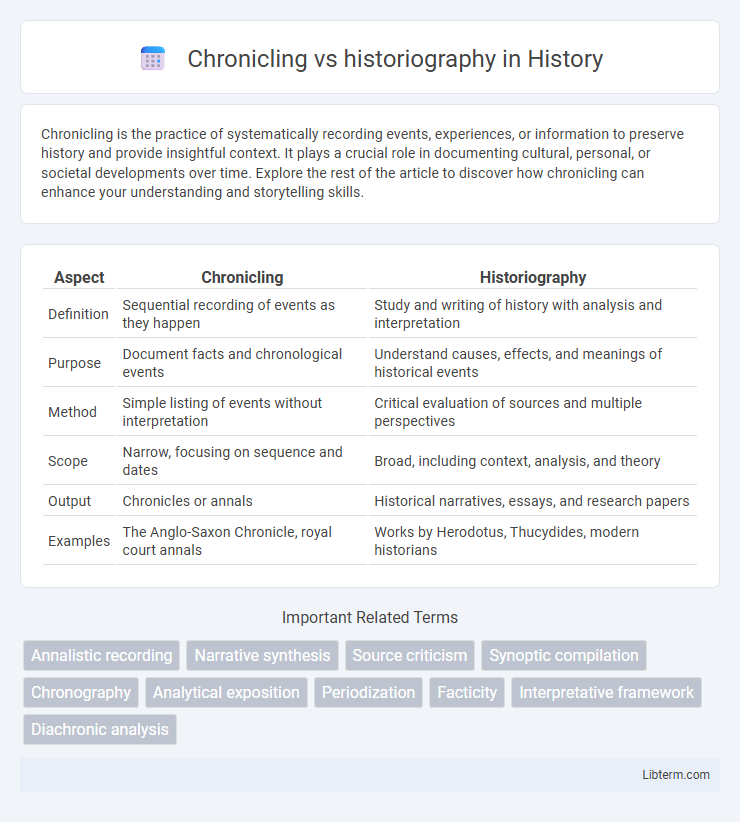Chronicling is the practice of systematically recording events, experiences, or information to preserve history and provide insightful context. It plays a crucial role in documenting cultural, personal, or societal developments over time. Explore the rest of the article to discover how chronicling can enhance your understanding and storytelling skills.
Table of Comparison
| Aspect | Chronicling | Historiography |
|---|---|---|
| Definition | Sequential recording of events as they happen | Study and writing of history with analysis and interpretation |
| Purpose | Document facts and chronological events | Understand causes, effects, and meanings of historical events |
| Method | Simple listing of events without interpretation | Critical evaluation of sources and multiple perspectives |
| Scope | Narrow, focusing on sequence and dates | Broad, including context, analysis, and theory |
| Output | Chronicles or annals | Historical narratives, essays, and research papers |
| Examples | The Anglo-Saxon Chronicle, royal court annals | Works by Herodotus, Thucydides, modern historians |
Defining Chronicling and Historiography
Chronicling involves the straightforward recording of events in chronological order, emphasizing factual accuracy and immediate documentation without interpretation. Historiography, by contrast, encompasses the study and analysis of historical writing, focusing on the methods, sources, and perspectives used to interpret past events. While chronicling preserves raw data, historiography critically examines the context and significance behind those events to construct a narrative.
Origins and Evolution of Chronicling
Chronicling originated in the early medieval period as a straightforward method of recording events in chronological order without analysis or interpretation. It evolved from monastic scribes' efforts to document significant happenings year by year, providing a foundation for later historical inquiry. Over time, chronicling shifted towards more detailed and narrative forms, setting the stage for the development of historiography as an analytical and interpretive discipline.
The Emergence of Historiography
The emergence of historiography marked a shift from mere chronicling to the analytical study of history, emphasizing interpretation and critical evaluation of sources. Unlike chronicling, which records events in a linear, factual manner, historiography incorporates context, cause, and consequence, shaping historical narratives through methodological frameworks. This transition reflected the intellectual advancements in ancient civilizations, notably by Herodotus and Thucydides, who introduced inquiry and narrative analysis into historical writing.
Purpose and Methodology: Chroniclers vs Historians
Chroniclers primarily aim to record events in a straightforward, chronological manner, focusing on documenting facts without extensive analysis or interpretation. Historians engage in critical examination of sources, employing methodologies to evaluate context, causes, and consequences to construct a comprehensive understanding of the past. The purpose of chronicling is preservation of occurrences as they happen, whereas historiography involves interpreting and analyzing historical narratives to provide insight and meaning.
Narrative Styles and Approaches
Chronicling emphasizes a straightforward, linear narrative style that records events in chronological order with minimal interpretation, prioritizing factual accuracy and immediacy. Historiography involves analytical approaches that explore causes, contexts, and varying perspectives, often engaging with theoretical frameworks to interpret past events. These contrasting narrative techniques highlight how chronicling serves as a foundation of raw data, while historiography critically constructs meaning and situates history within broader intellectual debates.
Source Material and Evidence Usage
Chronicling involves the straightforward recording of events based on primary source materials such as eyewitness accounts, official records, and contemporaneous documents without extensive interpretation. Historiography critically analyzes these sources, assessing their reliability, context, and bias to construct a nuanced understanding of historical events. This process integrates various evidence types including archaeological findings, oral histories, and secondary analyses, emphasizing source criticism and theoretical frameworks to interpret the past.
Objectivity and Interpretation
Chronicling involves recording events in a straightforward, factual manner with an emphasis on objectivity and minimal interpretation. Historiography encompasses the analysis and interpretation of historical events, reflecting the historian's perspective and theoretical framework. While chronicling prioritizes accurate, unbiased documentation, historiography examines the meaning and context behind those events, introducing interpretative layers.
Influence on Historical Understanding
Chronicling provides a direct, often contemporaneous account of events, capturing immediate perspectives and details that shape initial historical narratives. Historiography analyzes and interprets these primary accounts through critical methods, revealing biases, contexts, and evolving interpretations over time. The interplay between chronicling and historiography enriches historical understanding by blending raw data with reflective scholarship, allowing for a more nuanced comprehension of past events.
Modern Perspectives on Chronicling and Historiography
Modern perspectives on chronicling emphasize its role in preserving firsthand accounts and cultural narratives through detailed records, often highlighting narrative style and personal experience. Historiography, by contrast, critically analyzes these records by examining sources, interpreting contexts, and evaluating biases to construct comprehensive historical understandings. The evolving dialogue between chronicling and historiography reflects a dynamic balance between documentation and analytical interpretation in contemporary historical scholarship.
Future Trends in Historical Documentation
Future trends in historical documentation emphasize the integration of digital chronicling methods with advanced historiography techniques, enhancing accuracy and accessibility. Emerging technologies such as artificial intelligence and blockchain are set to revolutionize the authentication and preservation of historical records, enabling dynamic, real-time historical narratives. These innovations promote collaborative platforms that allow historians and the public to contribute, ensuring diverse perspectives and richer historiographical analyses.
Chronicling Infographic

 libterm.com
libterm.com